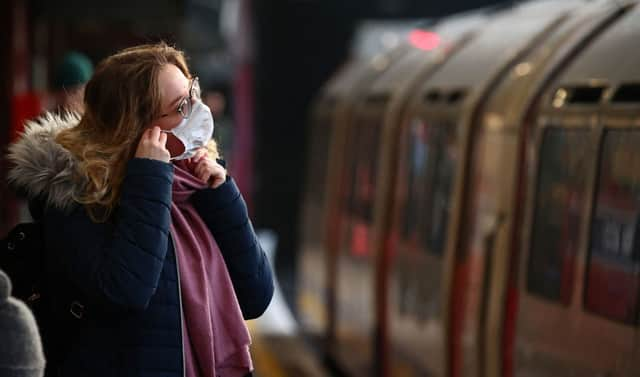All the places you now have to wear a face mask in England - and where you don’t


Face masks are now compulsory once again in England in certain settings as part of the government’s emergency measures to control the spread of the Omicron Covid variant.
The rules came into force from 4am on Tuesday (30 November) as a precaution while more data is gathered on the transmissibility of the new strain, including any possible effects on vaccines.
Advertisement
Hide AdAdvertisement
Hide AdPrime Minister Boris Johnson said vaccines and boosters continue to be the best form of defence against coronavirus and urged everyone who is eligible for the jabs to come forward.
Mr Johnson said: “The measures taking effect today are proportionate and responsible, and will buy us time in the face of this new variant.
“Based on everything we know, our vaccines and boosters remain our best line of defence, so it is more important than ever that people come forward when eligible to get boosted.
“Not only will today’s steps help us slow down the variant’s spread, but they will help us protect each other and the gains we have all worked so hard for.”
Advertisement
Hide AdAdvertisement
Hide AdThe new measures, which also includes changes to Covid testing after returning to the UK from abroad, are temporary and will be reviewed by the government in three weeks.
Where do I have to wear a face mask?
As of 4am on Tuesday 30 November, face masks must be worn in all of the following settings in England:
- shops and supermarkets (places that offer goods or services for retail sale or hire)
- shopping centres (malls and indoor markets)
- auction houses
- post offices, banks, building societies, credit unions, short-term loan providers, savings clubs and money service businesses
- estate and letting agents
- premises providing personal care and beauty treatments (barbers, hair salons, tattoo and piercing studios, nail salons and massage centres)
- pharmacies
- premises providing veterinary services
- retail galleries
- retail travel agents
- takeaways without space for consumption of food or drink on premises
- public transport (aeroplanes, trains, trams, buses, coaches and ferries), taxis and private hire vehicles
- transport hubs (airports, rail and tram stations and terminals, maritime ports and terminals, bus and coach stations and terminals)
- any car or small van during a professionally delivered driving lesson and practical driving testduring all HGV lessons and tests, during all professional driving lessons and formal driving tests, and during any practical test for giving driving instruction
Department for Education guidance also states that face coverings should be worn by university students and staff in communal spaces and corridors.
Where don’t I have to wear a face mask?
Face masks will not be required in pubs, bars or restaurants, or at concerts or events.
Advertisement
Hide AdAdvertisement
Hide AdHealth experts have criticised the decision not to extend the rules to hospitality venues, saying the current advice is not strong enough to control infections.
Sage member Professor Sir Mark Walport, told Sky News: “If you are in a small, poorly ventilated enclosed space, it makes sense to wear a mask.
“Clearly when you are drinking and eating it’s not possible to do that but if you’re moving around, then absolutely.
“We know that infection happens in closed spaces indoors and of course, as it gets colder, people are more likely to be indoors and they’re less likely to have the windows open.
Advertisement
Hide AdAdvertisement
Hide Ad“So if you’re going to wear masks in shops, it makes sense to wear them in other places as well.”
Dr Chaand Nagpaul, chair of council at the British Medical Association (BMA), agreed that masks need to be worn in all enclosed indoor settings.
He told Good Morning Britain: “What we believe is that there should be mask-wearing in all settings which are enclosed and indoors.
“Now clearly, that doesn’t apply to people who are eating out, but it should apply to staff, for example, in restaurants and bars so that when you are close to a customer, when you’re in direct line of a customer and you’re speaking perhaps loudly, you reduce the chance of infecting others.
Advertisement
Hide AdAdvertisement
Hide Ad“This isn’t just about the public, it’s also about staff and employers as well, because if they have staff who become infected, staff who are ill and self-isolating, that will also affect the economy.”
What happens if I don’t wear a mask?
The new rules are enforceable by a penalty, meaning those who fail to comply will be fined.
Failure to wear a mask will result in a £200 fine for the first offence, but this charge will then double for any further rule breaks.
As such, a second offence will be punishable by £400, a third will cost £800, with fines continuing to climb up to £6,400.
This article originally appeared on our sister site, NationalWorld.